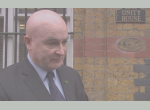Similar topics:
TUBE UNION RMT confirmed today that it has begun balloting the underground’s crucial Power Control Room staff for strike action and action short of a strike in a dispute over pay grade progression.
In a recent referendum ballot on London Underground’s latest proposals to the staff they were rejected by a vote of 100% and the union is campaigning for a similar rock-solid mandate for industrial action.
RMT General Secretary Bob Crow said:
“We have tried to negotiate a solution to our members concerns over Power Room grade progression but the company have failed to come up with a serious package that meets past promises they have given us on pay parity and additional benefits at the top of the pay band.
“Our members rejected the latest proposals by 100% and we now have no option to move to a ballot for action involving these essential staff who power up the entire tube system. We have no doubt they will deliver a rock solid mandate.
“We hope that a strong Yes vote will force the company back to the negotiating table with a substantially improved offer.”
- Press releases on this site are taken from www.rmt.org.uk.
- 7168 reads
> RMT National News
- ‹ previous
- 4 of 12
- next ›





